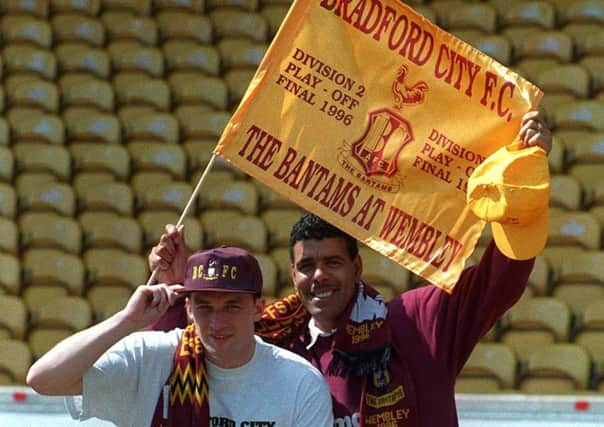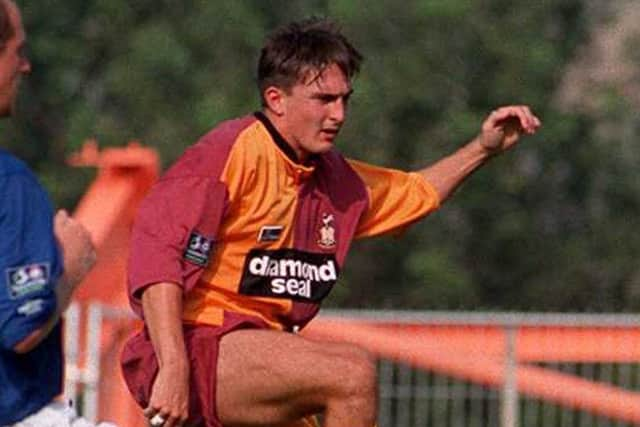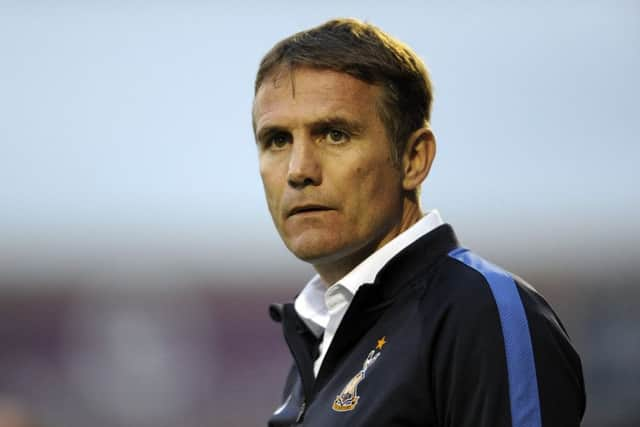Bygones: Route-map to Wembley put Bradford City back on course to play-off final


Bradford City, the side he had steered into the Division Two play-offs courtesy of a near faultless run-in, looked to have blown their hopes of promotion.
A 2-0 home defeat to Blackpool in the semi-final first leg meant few gave the Bantams any hope ahead of the return.
Advertisement
Hide AdAdvertisement
Hide AdKamara, having looked so dejected on returning home from Valley Parade that his wife had asked City’s chief scout Andy Smith to come over, was by now sitting in O’Donohue’s Irish pub in the centre of Wakefield and an impromptu post mortem into the afternoon’s events was well under way.


He had made a fundamental mistake with team selection against the Seasiders and knew it. Ian Ormondroyd, in his second spell at Bradford, had started the game but been dominated by a combination of Andy Morrison’s muscle and the aerial prowess of David Linighan.
City’s response, almost in panic, had been to pump more and more long balls forward to the 6ft 5in striker with predictable results. Kamara knew a hugely different approach was needed at Bloomfield Road so out came the beer mats and pint pots as the table was turned into an impromptu tactics board.
“Playing ‘Stix’ (Ormondroyd) had been a massive mistake,” recalls the 58-year-old, now a hugely respected broadcaster with Sky Sports, when speaking to The Yorkshire Post 20 years on from those play-off games with Sam Allardyce’s Seasiders.
Advertisement
Hide AdAdvertisement
Hide Ad“I hadn’t factored in how Linighan and Morrison would dominate Stix. One went up with Stix and the other was in front of him. He couldn’t get to anything. And, as all we did was pump long balls forward, Blackpool were able to dominate.


“I didn’t attach any blame to the players on the day. I had played the wrong tactics, simple as that. Sitting in the pub later that night, we went through a few things and then the beer mats came out as we looked for a way to turn things round.”
That plan involved dropping Ormondroyd, the club’s third highest scorer that season, and opting for a formation that saw Carl Shutt sit just in front of the midfield and Mark Stallard occupy a role slightly deeper than that of a normal striker.
Des Hamilton and Andy Kiwomya, City’s two wingers, were also ordered not to cross the ball until at least level with the edge of the penalty area. “Morrison and Linighan had dealt easily with any crosses from deep in the first leg so it was important there was no repeat,” added Kamara.
Advertisement
Hide AdAdvertisement
Hide Ad“By insisting there be no crosses from deep and leaving their centre halves with effectively no-one to mark, I felt we could really get into Blackpool. It would take the strength away of Morrison and Linighan – and if we did that, we had a chance.”


Ormondroyd was called into the manager’s office on Monday morning and informed of the plan. “Stix was brilliant,” adds Kamara. “I said it was no reflection on him and that, if anything, he had been our best player because of the way he fought and battled in very difficult circumstances.
“He knew it was for the good of the team and accepted the decision, even if he was disappointed not to start.”
Kamara’s belief had been restored. So, too, it seemed as training got under way had that of the players. City had won nine of their final dozen games to soar from 10th place to sixth so confidence had been high before that setback of losing the first leg to goals from Tony Ellis and Mark Bonner in front of a 14,273 crowd.
Advertisement
Hide AdAdvertisement
Hide AdThose supporters had trudged away from Valley Parade in dejected mood. However, as with the players, they had been emboldened by the late surge towards the play-offs that had culminated in a dramatic 3-2 win at Hull City on the last day to keep Chesterfield at bay in the quest for the final play-off place.


For that trip to Boothferry Park, such had been the numbers of Bradfordians wanting to be there that the unusual step, on police advice, had been taken beforehand to hand over the South Stand – normally reserved for home fans – to the visitors.
Kamara knew City would be backed in significant numbers again at Blackpool but, even so, he recognised an additional piece of motivation would not go amiss.
It came via Blackpool’s match-day programme. Having arrived ahead of his players – who were still sleeping at the team hotel – Kamara picked up a copy and started to leaf through. He could not believe his eyes. Not only was the tone bordering on triumphalism following that victory in West Yorkshire three days earlier but the club had also printed maps of how to get to Wembley and details of coach travel.
Advertisement
Hide AdAdvertisement
Hide AdKamara knew what to do straight away. He dug deep into his pockets and bought as many copies as the seller had. Minutes later, the offending articles were plastered all over the walls of the away dressing room, ready for the Bantams players’ arrival.
“At first I was annoyed by what I was reading,” he says. “But then I decided we could use this to our advantage, as I wanted the players to see what Blackpool were thinking.
“I have spoken to Big Sam plenty of times about that night and, at the time, he didn’t know anything about what was going in the programme. The club made the decision what to put in and that was that. Sam doesn’t think it affected the match but, from my point of view, it allowed me to emphasise to the players that Blackpool thought they were already at Wembley and that the job was done. It was up to us to prove them wrong.”
Fuelled by Kamara’s psychological masterstroke and following to the letter his tactics, City dominated more or less from start to finish. More urgent on the ball and with both Morrison and Linighan’s influence dissipated, the visitors missed two good chances before Shutt broke the deadlock shortly before half-time.
Advertisement
Hide AdAdvertisement
Hide AdMidway through the second half, the tie was level on aggregate after Kiwomya raced to the byline before crossing for Hamilton to finish with aplomb. Kamara had believed ahead of kick-off that Bradford would need extra-time to go through but, in the end, the additional half-hour was not needed.
Instead, Stallard fired past Eric Nixon with 11 minutes remaining and what still remains the biggest fightback in play-off history by a Yorkshire club was complete. City were on their way to Wembley and, eventually, promotion to the second tier.
Twenty years on and the Bantams are hoping to repeat that success after booking their place in the League One play-offs. “The big thing in Bradford’s favour is Phil Parkinson,” said Kamara. “How they have managed to hold on to him after all he has achieved is remarkable.
“The Cup results Bradford have had along with getting to the Capital One Cup final mean they will fancy their chances of repeating what we did 20 years ago.”
Richmond plan proved ahead of its time
Advertisement
Hide AdAdvertisement
Hide AdWHEN chairman Geoffrey Richmond unveiled plans in February, 1996, to build a new cantilever stand on the Midland Road side of Valley Parade, it seemed fanciful thinking.
The new structure, set to replace the shallow terrace that had occupied that side of the ground for the previous 30 years, would hold 4,500 spectators and yet on the night that the Bantams revealed the plans just 3,804 had been present to watch a 2-0 victory over Wrexham.
That result nudged Chris Kamara’s City up a place to 10th but promotion –- and a chance to fill the proposed new stand – looked a distant dream. Hence why there was plenty questioning why Bradford were committing £1.4m to the plans.
Richmond, though, was a man in a hurry. So, too, was the club itself as that victory over Wrexham helped spark a late charge that saw a play-off place booked on the final day of the season.
Advertisement
Hide AdAdvertisement
Hide AdThree weeks later, City were taking 30,000 fans to Wembley for a final that was won with ease against Notts County. By the time the new Midland Road stand had been opened for the visit of Sheffield United on Boxing Day to raise the capacity to around 18,000, Valley Parade was regularly hosting crowds that fully justified Richmond’s thinking.